
A Desert Called Peace by Tom Kratman
My rating: 3 of 5 stars
Personal Enthusiasm: It Was Okay
Read for free, at the Baen Free Library
This is a story that mostly works. It's a combination of a revenge fantasy and a polemical and Kratman does a very good job of pulling off both sides.
The story centers around Patricio Hennessey de Carrera, a retired military officer living on the planet Terra Nova. His world is turned upside down when his wife and 4 children (the youngest daughter still unborn) are killed in a terrorist attack. Fighting his way out of nearly suicidal grief, he comes out of retirement, builds an army, and uses it towards the goal of killing everyone who directly or indirectly had a hand in the terrorist attacks.
That's, rather self-evidently, the revenge fantasy portion of the work. Those elements of the story really work and are done well.
The polemical bit comes when you consider who the various groups in the story are. Carrera is clearly a stand-in for a competent but too blunt American military officer. And the terrorists who killed his wife and children are clearly barbarian Islamic fanatics. And the building destroyed in the terrorist attack is clearly a stand-in for the World Trade Center towers. The story is best seen as a description of what happened to America on 9/11 and how we should have responded to it.
It's also a look at how we will have to become (at least somewhat) more like our enemies, in order to win. It's not always pleasant but Kratman doesn't try to make us feel good about the changes. He just wants us to recognizes that victory won't be easy and it will probably change us.
The polemical part of the story works fairly well and is well-integrated into the rest of the novel. It's not forced and the explanations and and motivations that make it up are simply in the natural flow of the story.
So far, so good. But the book goes completely off the rails when it comes to the setting. I mentioned that the book takes place on another planet, Terra Nova. This is a planet that a robotic exploring ship just happened to find. It's a planet that just happened to have been settled by every major nation and ethnic group on Earth. It's a planet that just happened to have geography similar to Earth's. It's a planet where the settlers just happened to group themselves similarly to how people are grouped on Earth.
There is a clear and direct correlation between the countries of Terra Nova and the countries of Earth. It's fairly easy to make a translation list.
- The USA is represented by the Federated States of Columbia (FSC).
- The United Kingdom is represented by the Kingdom of Anglia.
- France is represented by the Gallic Republic.
- Germany is represented by Sachsen.
- Iraq is represented by Sumer.
- Afghanistan is represented by Pashtia.
- Iran is represented by Farsia.
- Russia is represented by Volgon.
- Japan is represented by Yamato.
- Europe as a whole is represented by Taurus.
- The European Union is represented by the Tauran Union.
Yes, you saw that right. Not only are individual countries represented by their oh so similarly named counterparts but so are political boundaries. In fact, it gets much worse. Not only the geography and politics are the same between Earth and Terra Nova but so is the history!
This planet, settled from Earth, had many of the same wars and conflicts Earth. For instance, there was a Great Global War that featured the same alliances and events as World Wars I and II. In fact, at the end of the Great Global War, the FSC dropped two nuclear bombs on Yamato. There was a Sumer-Farsia War that happened in the not too distant past. There was a recent "Petrol War" that sounded very similar to Desert Storm.
Much of the book takes place in and around the country of Balboa. Balboa, geographically and culturally, is very similar to Panama. In fact, the Balboans even have a "Balboa Transitway" that's identical to the Panama Canal.
This level of correspondance is highly, highly frustrating. Why make the reader spend all of the effort to make a mental map between the nations and history of Terra Nova and the nations and history of Earth? Especially when the end result is Earth in everything but name? What is the point of all of that work? Why not just set the story in an alternate history version of this past decade?
Everytime I wanted to get lost in the world, I kept getting bludgeoned with the similarities between the world of the book and our world today. It totally destroyed my ability to immerse myself in the book and just enjoy it.
I liked the characters in the book (even if they were formulaic) and I liked the story. I really didn't like the setting, so I can't rate this book as highly as I would otherwise like too. I can only say that it was disappointing, overall.



